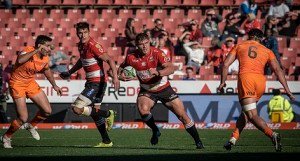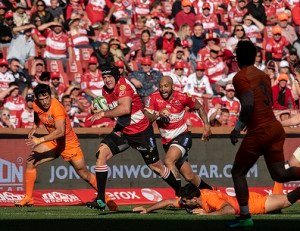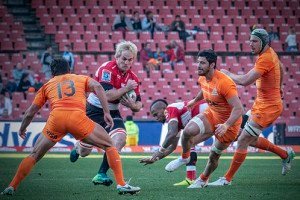Janse van Rensburg & Richardson tasked with laying down the law for Sharks 0
Springbok centre Rohan Janse van Rensburg and Scottish international Dylan Richardson will be the two main ball-carriers tasked with laying down the law for the Sharks in their opening United Rugby Championship match against Zebre in Parma on Friday night.
Sharks coach Sean Everitt named his first URC team of the season on Wednesday, following their first-round bye, and rushed Janse van Rensburg, one of his major signings in the off-season, straight into the No.12 jersey. Capped for the Springboks in 2016, Janse van Rensburg made his name with the Lions as a fan-favourite who was explosive on the crash-ball but also slick in terms of his all-round game-management. The 28-year-old moved to Durban after four successful years with the Sale Sharks in Manchester.
Richardson, who often plays hooker, made his debut for Scotland last year and will play blindside flank in a mobile, pacey loose trio against Zebre. The 23-year-old is more accustomed to being openside flank whenever he has played loose forward.
“Rohan has been a revelation and he brings lot of experience, being an international,” Everitt said. “With Ben Tapuai, we have two very experienced centres to guide Boeta Chamberlain at flyhalf.
“Rohan has settled in very well, he brings leadership and has been a strong voice in team meetings. His knowledge and assistance in developing the youngsters will be vitally important.
“Dylan normally plays at No.6, but he is also known for his very strong ball-carrying. We’ve played him and James Venter together in the Currie Cup with a lot of success.
“Together with Phepsi Buthelezi, they will get through a lot of work and they have been the form loose forwards in training,” Everitt said.
The northern city of Parma is one of the prime gastronomical districts of Italy, and a long injury list has given Everitt plenty of food for thought. Especially in the pivotal flyhalf position.
“We have a long list of injuries so this is a young team,” Everitt said. “It is getting shorter though and we expect a full complement of players soon, and then it will be great to have more selection headaches.
“Except for the flyhalves, who we only expect back at the end of October. Lionel Cronje has a fractured arm and Curwin Bosch underwent surgery on a fractured thumb. You would never bet on two flyhalves getting injured, but that’s the nature of rugby.
“We’re fortunate to have Boeta step in, he really took his opportunity this time last year and performed admirably overseas. He is full of confidence at the moment,” Everitt said.
Sharks team: Aphelele Fassi, Werner Kok, Ben Tapuai, Rohan Janse van Rensburg, Thaakir Abrahams, Boeta Chamberlain, Grant Williams, Phepsi Buthelezi, Dylan Richardson, James Venter, Reniel Hugo, Gerbrandt Grobler, Thomas du Toit (c), Kerron van Vuuren, Ntuthuko Mchunu. Replacements – Dan Jooste, Dian Bleuler, Carlu Sadie, Justin Basson, Sikhumbuzo Notshe, Cameron Wright, Fred Zeilinga, Marnus Potgieter.



